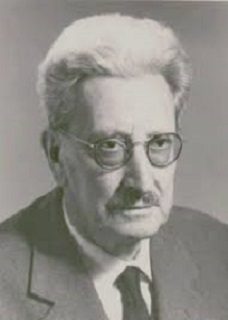Biography of Bruno Pincherle
Bruno Pincherle (Trieste 1903-1968) was a paediatrician held in high esteem, who stood out on the cultural scene not only for his modern approach to medicine but also for his literary studies and antifascist militancy.
He developed an interest for antique books early on, encouraged by two people close to him during his youth: the medical historian Arturo Castiglioni, a friend of his fathers, and doctor Vittorio Pavia. The role played by Castiglioni in the book collection was mainly preliminary: it was he who directed the young man towards studying medical and again he who gifted Pincherle with his first books on medicine. Traces of these gifts given over time can still be seen in the Collection, thanks to handwritten notes relating to presents found on some works of Castiglioni or other marks showing that he was the original owner of the volumes. The Collection’s genesis can therefore probably be traced more to study needs than bibliophile interests and can be dated to late 1921, when Pincherle enrolled with the Faculty of Medicine of the Royal Institute of Further Education of Florence. The role played by Vittorio Pavia in creating the Collection was instead different and far more direct. Pavia was an important figure for Pincherle. Passionate about books, at his death in 1940, he left Pincherle his books on medicine. At a mature age, in Trieste, Pincherle also developed a close friendship with Umberto Saba, whose bookshop he frequented assiduously.
His Jewish origins and political commitment were always a major hindrance in his profession. In 1927, after graduating, he began working as a volunteer at the Medical Clinic of Genoa. Unfortunately, in 1928, his antifascist political stance led to his arrest and being sent to Trieste with an internal exile note. It being impossible to find work, he moved to Vienna, where he came into contact with representatives of socialism and later specialised in paediatrics in 1933 in Milan.
After the 1938 proclamation of the racial laws, he was removed from his position in the hospital, expelled from the Order of physicians and then arrested and sent, together with his brother Gino, to a prison camp, first near Salerno and then Macerata.
Due to his being prohibited from exercising his profession from 1938, he focussed his attention on his literary studies, particularly on Stendhal, and on the studies of the history of medicine. Pincherle in fact stood out for his studies on Stendhal, of which evidence can be found in the considerable collection of books donated to the Sormani Library of Milan.
After the war, he continued his political activities on a local level (he was representative of the PSI and PSIUP Popular Unit), which gave rise to some hostility in the medical environment, resulting in his being denied the position of Director of Burlo. He thus continued to run his own paediatric surgery and collaborate with the Infant Clinic.
This did not, however, prevent him from being considered one of the most interesting medical-scientific profiles of the times, cultivating multiple interests (he was also a skilled caricaturist) and a free spirit, making him an important figure of the twentieth century.
Biographical sources
Rudj Gorian, Bruno Pincherle gli scritti e la biblioteca di storia della medicina, Trieste, Piazzetta Stendhal, 1, 2009;
Monica Rebeschini, La Trieste di Pincherle. Cultura e impegno civile di un intellettuale di frontiera, Trieste, Comunicarte, 2008;
Roberto Costa Longeri, Bruno Pincherle oggi a quarant’anni dalla morte. [Preface by Cristina Benussi], Empoli, Ibiskos editrice Risolo, 2008;
Miriam Coen, Bruno Pincherle, Trieste, Comunicarte, 2008;
Federica Scrimin, Un dottore tutto matto, sulla testa un gatto. Bruno Pincherle: storia e storie di un pediatra con i disegni di Bruno Pincherle, Trieste, editoriale Scienza, 2004;
Monica Rebeschini, Bruno Pincherle interventi e scritti politici. With an introduction by Enzo Collotti, Trieste, piazzetta stendhal, 1, 2004;
Georges Jessula, La dernière lettre de Bruno Pincherle, in “Stendhal Club”, n. 123, 15 avril 1989, pp. 233-234; Miriam Coen, Bruno Pincherle, Pordenone, Edizioni Studio Tesi, 1995;
Giordano Sivini, Prima dell’8 settembre. Un’intervista inedita con Bruno Pincherle, in “Il Ponte”, n. 5, 31 maggio 1969, pp. 657-669.

